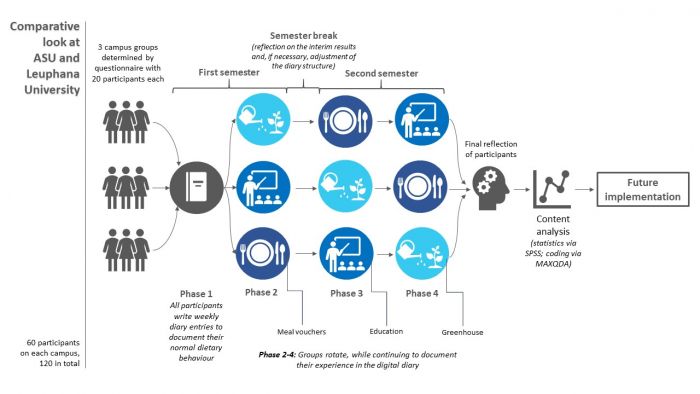Difference between revisions of "Mixed Methods Examples"
| Line 4: | Line 4: | ||
by Lauren Anderson, Elena Kortmann, Chantal Krumm, Elias Schiafone | by Lauren Anderson, Elena Kortmann, Chantal Krumm, Elias Schiafone | ||
| − | [[File:Mission 3 - TMNT - Visualisation.jpg| | + | [[File:Mission 3 - TMNT - Visualisation.jpg|700px|frameless|right|'''Visualisation of the research proposal on Diets.''' Source: Lauren Anderson, Elena Kortmann, Chantal Krumm, Elias Schiafone]] |
This research proposal revolves around the '''problem of providing affordable, yet healthy and sustainable food at university cafeterias''' in Germany and the US. The suggested idea here is to, first, conduct a [[Survey|'''questionnaire''']] with 60 first semester university students at two universities, each, based on which the participants will be grouped according to their financial resources, which are of interest to this study. Then, students take part in four six-week long project phases, in which they are asked to document in a '''digital diary''' their food consumption and review their experience with one of '''three rotating interventions''', as well as their initial behavioral patterns. The interventions either include meal vouchers for vegan or vegetarian meals at dining halls; educational sessions on health, sustainability and affordable nutrition as well as cooking classes; and engagement with a newly set up greenhouse. After going through all four phases, participants are asked to rank all interventions in a questionnaire. All diary and questionnaire data is analyzed qualitative and quantitatively, and suitable recommendations are developed for both universities based on the insights. | This research proposal revolves around the '''problem of providing affordable, yet healthy and sustainable food at university cafeterias''' in Germany and the US. The suggested idea here is to, first, conduct a [[Survey|'''questionnaire''']] with 60 first semester university students at two universities, each, based on which the participants will be grouped according to their financial resources, which are of interest to this study. Then, students take part in four six-week long project phases, in which they are asked to document in a '''digital diary''' their food consumption and review their experience with one of '''three rotating interventions''', as well as their initial behavioral patterns. The interventions either include meal vouchers for vegan or vegetarian meals at dining halls; educational sessions on health, sustainability and affordable nutrition as well as cooking classes; and engagement with a newly set up greenhouse. After going through all four phases, participants are asked to rank all interventions in a questionnaire. All diary and questionnaire data is analyzed qualitative and quantitatively, and suitable recommendations are developed for both universities based on the insights. | ||
Revision as of 08:50, 12 July 2021
This page presents examples of Mixed Methods research designs for sustainability research. The following texts are summaries of research proposals that were contributed by the credited students of M.Sc. (Global) Sustainability Science for the 2021 class "Research Methdos in Sustainability Science."
Providing healthy and affordable food at universities
by Lauren Anderson, Elena Kortmann, Chantal Krumm, Elias Schiafone
This research proposal revolves around the problem of providing affordable, yet healthy and sustainable food at university cafeterias in Germany and the US. The suggested idea here is to, first, conduct a questionnaire with 60 first semester university students at two universities, each, based on which the participants will be grouped according to their financial resources, which are of interest to this study. Then, students take part in four six-week long project phases, in which they are asked to document in a digital diary their food consumption and review their experience with one of three rotating interventions, as well as their initial behavioral patterns. The interventions either include meal vouchers for vegan or vegetarian meals at dining halls; educational sessions on health, sustainability and affordable nutrition as well as cooking classes; and engagement with a newly set up greenhouse. After going through all four phases, participants are asked to rank all interventions in a questionnaire. All diary and questionnaire data is analyzed qualitative and quantitatively, and suitable recommendations are developed for both universities based on the insights.
